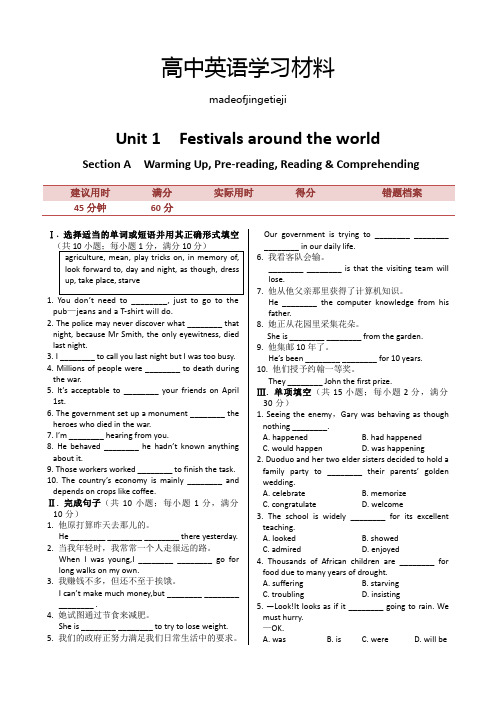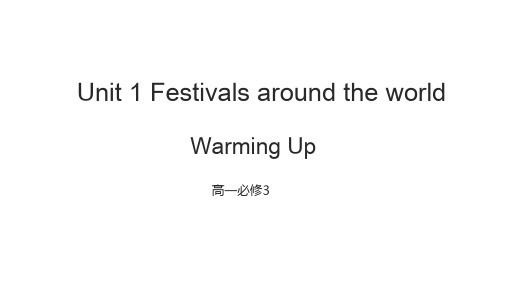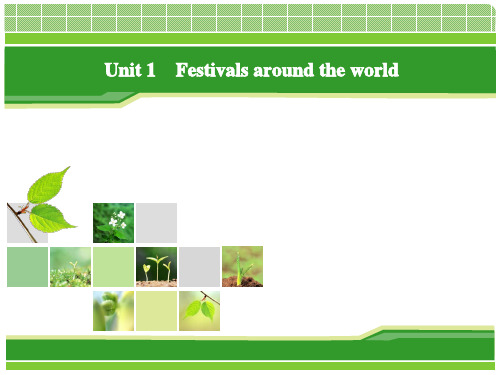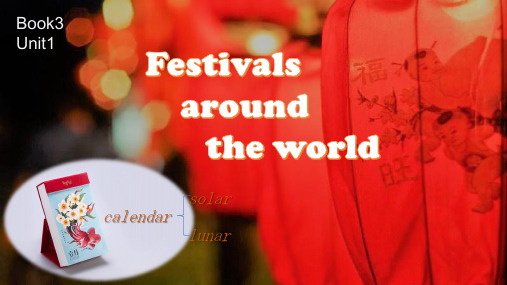必修3 unit 1 Festival Warming Up and reading
- 格式:ppt
- 大小:4.05 MB
- 文档页数:47

高中英语学习材料madeofjingetiejiUnit 1 Festivals around the world Section A Warming Up, Pre-reading, Reading & ComprehendingⅠ. 选择适当的单词或短语并用其正确形式填空(共10小题;每小题1分,满分10分)agriculture, mean, play tricks on, in memory of, look forward to, day and night, as though, dress up, take place, starve1. You don’t need to ________, just to go to the pub—jeans and a T-shirt will do.2. The police may never discover what ________ that night, because Mr Smith, the only eyewitness, died last night.3. I ________ to call you last night but I was too busy.4. Millions of people were ________ to death during the war.5. It’s acceptable to ________ your friends on April 1st.6. The government set up a monument ________ the heroes who died in the war.7. I’m ________ hearing from you.8. He behaved ________ he hadn’t known anything about it.9. Those workers worked ________ to finish the task.10. The country’s economy is mainly ________ and depends on crops like coffee.Ⅱ. 完成句子(共10小题;每小题1分,满分10分)1. 他原打算昨天去那儿的。



Unit 1 Festivals around the world(新课标版高一英语必修三教案教学设计)Unit 1 Festivals around the worldThe First Period (Warming up & Pre-reading)Step One: Lead-inFree Talk: Did you have a good time in your winter holidays?When did you feel most happy and excited? Why?( At the Spring Festival. Because it's the most important festival in our country....)Step Two: Warming up1. Let the Ss think about the other Chinese festivals.( Lantern Festival, Pure Brightness Festival, Dragon Boat Festival, Mid-Autumn Festival, New Year's Day, Chung Yeung Festival....)2. Discussion One1)Let the Ss look at the information about Chinese festivals and discuss another four Chinese festivals according to the example in warming up: When does the festival come?What do people celebrate?What do people do?Festivals Date festivals DateNew Year January1st Teachers' Day September 10thInternational Women's Day March 8 National Day October 1stArbor Day March 12th The Spring Festival Lunar New Year International labor Day May 1st Dragon Boat Festival the fifth day of the fifth lunar monthInternational Children's Day June 1st Mid-Autumn Festivalthe 15th day of the 8th lunar monthArmy Day August 1st Lantern Festival the 15th day of the 1st lunar monthChinese Youth Day May 4th Pure Brightness Day April the fifth2) Let the Ss fill in the form in the warming up and ask some to share their opinions with the whole class.3 Discussion TwoTalk about some foreign festivals.( Christmas, April Fools Day, Easter Day, Halloween, Valentine's Day, Thanksgiving Day, Obon...)Step three: Pre-readingLet students think about the questions:1) What is your favourate holiday of the year? Why?2)What festivals or celebrations do you enjoy in your city or town? Do you like spending festivals with your family or with friends? What part of a festival do you like best- the music, the things to see, the visits or the food?Step Four: Language Points1.mean to do 打算做某事mean doing 意味着….I never meant him to work for us.Passing the entrance examination means being admitted into college.2. celebrate vt.(1) do sth to show that a day or an event is important 庆祝;祝贺celebrate Christmas / one’s birthday / a wedding anniversary / a victory(2) praise and honor 赞扬;称颂The names of many heroes are celebrated by the poets.词语辨析:celebrate, congratulatecelebrate后常接日期、事情或场合。


人教新课标高中英语必修三Unit 1 Festivals around the world全章教案I.教学内容分析本单元的中心话题是“节日”,主要讲述了不同地区不同种类的节日。
Warming Up部分设计了小组活动,通过图表填写让学生区分中国的传统节日与别国节日的异同,目的在于激活学生已有的节日背景知识,引出主题,为以后几堂课学习热身。
Pre-reading 通过几个问题,调动学生已有的知识和经验,激发学生想了解更多节日的好奇心,让他们主动参与到主题教学活动中,为下面学习阅读文章作铺垫。
Reading 部分先简要介绍了一下早期各种节日的起源以及存在的原因,然后又分别介绍了几种世界各地的节日,依次的顺序是亡灵节、纪念名人的节日、丰收节、春天的节日等。
Comprehending由四个部分组成。
第一、三、四部分通过表格形式,第二部分通过让学生回答问题的方式,鼓励学生积极思考,加深对课文的理解。
Learning about Language 部分主要突出了本单元的语法项目——情态动词的用法。
这些情态动词主要有:can,could,may,might,will,would,shall,should,must,can’t 等的用法。
Using Language 部分中包括了听、说、读、写几个部分的内容。
学生可通过对Trinidad Carnival、情人节等一些节日的学习,分析问题,锻炼自己的思维能力。
阅读后的习题及讨论不仅帮助学生理解文章的主旨大意,更重要的是让学生寻找解决问题的方法。
Learning Tip部分主要建议学生搜集各种资料,查询与世界各地节日有关的信息,了解各种节日的来源与内涵。
II.教学重点和难点1. 教学重点(1) 本单元的生词和短语;(2) 掌握一些情态动词的基本用法;(3) 了解有关节日和民俗,掌握有关词汇,如custom,religious等。
2. 教学难点(1) 增进学生对中国节日的理解,了解和感悟外国的节日;(2) 提高学生的社会文化素质,加强跨国文化素质;(3) 培养学生运用资源策略。
Unit 1Section ⅡWarming Up & Reading—Language Points课时作业Ⅰ.单句语法填空1.Many people died of starvation (starve) in Africa that year.2.I hold the belief that he will succeed.3.Awarded (award) the first prize in the competition, he felt happy and satisfied.4.In order to go to the palace ball, the pretty girl is dressing herself up carefully.5.I think it's impolite to play a trick on others just for fun.6.They call their son Albert Franz in memory of their father.7.New Year celebrations (celebrate) in Scotland go on for three days.8.It seemed as if the man in the picture had moved (move).9.The Spring Festival is coming. I'm looking forward to returning (return) home.10.With a lot of work to do (do), he wasn't allowed to go out.Ⅱ.单句改错1.He did it in the belief whether he was right.whether→that2.Either you or the headmaster are to hand out the prizes to those gifted students at the meeting.are→is3.If the neighbours do not give any sweets, the children might play a trick at them.at→on4.We are looking forward to hold a party.hold→holding5.With prices goes up so fast, we can't afford luxuries.goes→going/With→As Ⅲ.阅读理解You can deal with winter in two ways: escape it or embrace it. Watching people dive into snow—in nothing but bathing suits and boots—I'm guessing these people choose to do the latter.The seasonal madness is part of the Quebec Winter Carnival, now in its 62nd year, said to be the world's largest winter festival. About a half-million people each year come to Quebec City to delight in frigid (寒冷的) fashion.“We embrace winter,”said Paule Bergeron of Quebec City Tourism.“It's time to play.” The carnival runs from Jan. 29 to Feb. 14, with dozens of events. I went last year for a few frigid days, staying at the Hilton Quebec, in the thick of the downtown action. Families are a big part of the carnival. What attract kids are things like ice-fishing at a man-made pond stocked with fish, where if you catch something, you can pay to have it smoked and eat it, or donate it to a food bank.It's a good chance to experience the culture of this European-feeling city, and nowhere is more evident than in Bonhomme, the carnival's goodwill ambassador, a living avatar (化身) in the form of a giant snowman with a human inside gliding (滑行) around the festivities.There are two night parades at the carnival. I attended the second one last year, the night before the carnival's close. The streets were lined with thousands of people in a gentle snow and bitter cold, watching local dancers and school groups glide by. In the end, Bonhomme's float came into view, and kids in the crowd went crazy. As the parade ended, thousands followed behind it, becoming part of the Quebec Winter Carnival's magic and madness. And with a cup of milk in my hand, I realized that for once, not only did I not mind winter, I embraced it.【解题导语】本文为说明文。
绝密★启用前人教版必修三Unit 1 Festivals around the world1. Warming Up and Reading一、单词拼写1.Nobody knows exactly the ________ (起源) of the earth.2.He ________ (欺骗) the girl and took away all her money.3.He ________ (获得) full marks in the examination.4.The street cleaner is ________ (收集) rubbish in the rain.5.The winner was ________ (授予) a gold medal.6.She ________ (欣赏) your works very much.7.The homeless children were ________ (渴望) for safety and love.8.The story of his miseries is beyond my ________ (信任).9.On my ________ (到达) at the hotel, he gave me a sweet kiss.10.You see, the ________ (精力充沛的) young man plays basketball day and night.二、完成句子11.The sports meeting __________________ (举行) next week.12.Millions of people __________________ (饿死) during the war.13.The monument was built __________________ (纪念) the little hero.14.There is no need ____________________ (化妆)—come as you are.15.We all __________________ (对她表示钦佩) what she had done.16.She __________________ (一直盼望) having a chance to pay a visit to Zhangjiajie.17.We've missed the bus. __________________ (看来好像) we'll have to take a taxi.18.These children loved __________________ (捉弄) their teacher.19.I __________________ (结识了很多朋友) since I arrived.20.You'll be sure __________________ (玩得开心) at the party tonight.三、阅读理解AHow would you like to have been born without any ability to feel pain? There are such people. One of them is being studied by doctors at a hospital in New York City. He is a 22-year-old clerk who really does not know the meaning of pain. But he wishes he did. Not long ago a packet of matches flared up(骤然烧起) in his hand. Luckily the burn was not serious. It caused large blisters(水泡) but still did not bother him. He said the burn felt like a fly crawling(在……上爬行) on his fingers. It has been the same story as far back as he can remember. He has never had headaches or sore(疼痛的) muscles. Bee stings, cuts and bruises(疼痛的) do not hurt.Being free from pain is not as wonderful as you may think. The young man has had to have rotted teeth pulled because he never felt toothache warnings. A sudden attack of appendicitis(阑尾炎) could be deadly. Life without pain is as risky as trying to run a cruise ship without fire alarms.21.In the final sentence, the writer uses “fire alarms” to mean ________.A. loud noises that a person hearsB. a signal that something is wrongC. heat warningsD. the ability to smell smoke22.The selection as a whole points to the fact that ________.A. fire can cause serious injuriesB. life is happier without painC. teeth can be pulled painlesslyD. pain serves a useful purpose23.The young man had to have teeth pulled because ________.A. he did not know his teeth were decayingB. he did not take care of his teeth properlyC. he did not like to visit the dentistD. he was born with soft teethBWhen asked to point out one or two things that are most important to themselves, many put friends ahead of homes, jobs, clothes and cars.A true friendship carries a long history of experience that determines who we are and keeps us connected. It is a treasure we should protect. Unfortunately, the better friends you are, the more probably you’ll have disagreements. And the result can be what you don’t want—an end to the relationship.The good news is that most troubled friendships can be mended. First, don’t let your pride get in your way. Most of us can forgive each other when differences are brought out in the open. Second, apologize when you’re wrong — even if you’ve been wronged. Over the course of a friendship, even the best people make mistakes. Sometimes, it may be best if the wronged person takes the lead and apologizes. When you apologize, give your friend a chance to admit(承认) that he has been wrong. Third, see things from your friend’s point of view. And finally, accept that friendships change as our needs and lifestyle change. Making friends can sometimes seem easy. The hard part is keeping the connections strong during the natural ups and downs that have an effect on all relationships. My suggestion:consider friendship as an honor and a gift, and worth the effort to treasure and nurture(培养).24.What would be the best title for the passage?A. Easy Ways to Make FriendsB. Ups and Downs in FriendshipC. How to Mend a Troubled FriendshipD. How to Take the Lead in Making Friends25.The “wronged person” underlined in the passage refers to a person __________.A. who has been mistaken for anotherB. who has been blamed unfairlyC. who has treated friends badlyD. who has admitted his mistakes26.According to the passage, a friendship can be long only if __________.A. we have much in commonB. we know our friends’ mistakesC. we treat our disagreements wiselyD. we have known one another her desires27.What should we do if we follow the author’s second suggestion?A. Make an apology first.B. Avoid making mistakes.C. Stick to our own points of view.D. Change our lifestyles.四、七选五根据短文内容,从短文后的选项中选出能填入空白处的最佳选项。